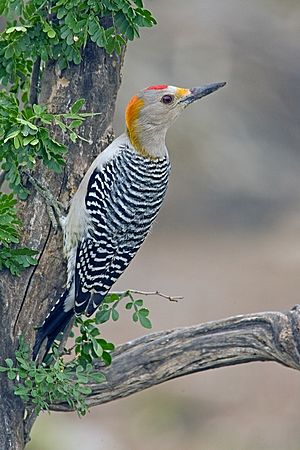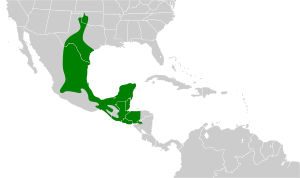Golden-fronted woodpecker facts for kids
Quick facts for kids Golden-fronted woodpecker |
|
|---|---|
 |
|
| A male from the northern subspecies group at Roma, Texas | |
| Conservation status | |
| Scientific classification | |
| Genus: |
Melanerpes
|
| Species: |
aurifrons
|
 |
|
The golden-fronted woodpecker (Melanerpes aurifrons) is a North American woodpecker. Its preferred habitat is mesquite, riparian woodlands, and tropical rainforest. It is distributed from Texas and Oklahoma in the United States through Mexico to Honduras and northern Nicaragua. Cooke listed this species as an abundant resident of the lower Rio Grande Valley, Texas, in 1884.
Taxonomy
Recent genetic data indicate that the species as currently constructed is paraphyletic. The golden-fronted, golden-naped, wide-bar-backed birds from the north of the range ("true" golden-fronted woodpeckers) were shown to be more closely related to red-bellied woodpecker than the red-fronted, red-naped, narrow-bar-backed birds from the south. It is suggested that the latter population, the santacruzi group, be treated as a separate species, Velasquez's woodpecker. It is found from eastern Mexico to Nicaragua.
Nesting
Nesting behavior of the golden-fronted is similar to that of the red-bellied woodpecker. Tall trees of pecan, oak, and mesquite are the major species used for nesting in the United States and northern Mexico. Occasionally fence posts, telephone poles, and bird boxes are used.
Diet
The diet of the golden-fronted woodpecker consists of both insects and vegetable matter. Grasshoppers make up more than half of the animal matter and other insects include beetles and ants. Vegetable matter consumed consists of corn, acorns, wild fruits, and berries.
Gallery
-
from the Mexican Boundary Survey
-
A "Velasquez's" golden-fronted woodpecker (M. a. dubius) from the Yucatán.
- Agriculture Handbook No. 511. November 1977. Forest Service. U.S. Department of Agriculture. Virgil E. Scott, Denver Wildlife Research Center. Keith E. Evans, North Central Forest Experiment Station. David R. Patton, Rocky Mountain Forest and Range Experiment Station. Charles P. Stone, Denver Wildlife Research Center. Illustrated by Arthur Singer.
See also
 In Spanish: Pájaro carpintero cheje para niños
In Spanish: Pájaro carpintero cheje para niños






